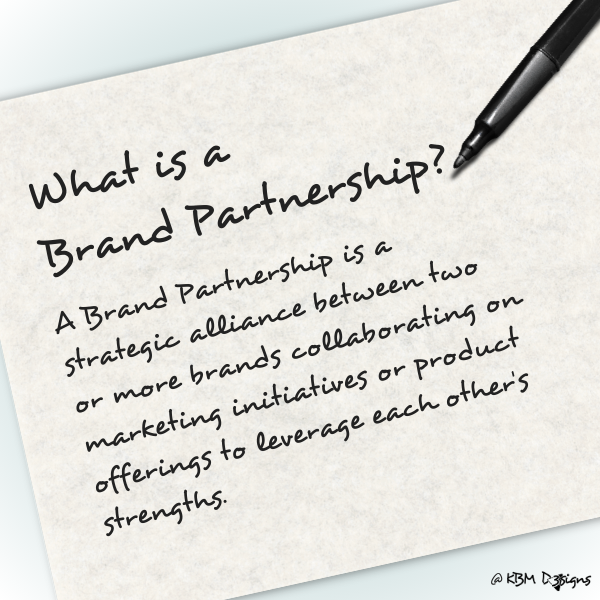What is a Brand Partnership? Small businesses face a competitive environment that demands innovative strategies to increase brand awareness, reach new demographics, and grow. One effective approach that is gaining traction is brand partnerships. This article provides a comprehensive overview of what brand partnerships entail and how they can benefit small businesses.

Article Content:
1. What is a Brand Partnership?
A brand partnership, also known as co-branding or brand collaboration, is a strategic alliance between two or more brands with complementary products, services, or target markets. It involves the mutual agreement to work together on marketing initiatives or product offerings to leverage each other’s strengths and resources.
2. Types of Brand Partnerships:
2.1. Product Collaboration:
This involves two brands collaborating to create a new product or service that combines elements of each brand. For example, a clothing brand might partner with a popular artist to design a limited-edition clothing line.
2.2. Co-Marketing Campaigns:
Brands join forces to create marketing campaigns that promote both companies simultaneously. This could include joint social media campaigns, email marketing, or sponsored events.
2.3. Cross-Promotions:
Brands agree to promote each other’s products or services to their respective customer bases. For instance, a coffee shop might partner with a local bakery to offer discounts to each other’s customers.
2.4. Event Sponsorships:
Brands sponsor or co-host events together. These include industry conferences, workshops, or community events that build visibility and credibility.
3. Benefits of Brand Partnerships for Small Businesses:
- Expanded Reach: Partnering with another brand allows small businesses to tap into each other’s customer base. And ultimately, reach new audiences that may have been previously inaccessible.
- Cost-Effective Marketing: By sharing resources and costs, small businesses can execute marketing campaigns and initiatives that would have been unaffordable independently.
- Enhanced Credibility: Associating with a reputable brand can enhance the credibility and reputation of a small business, helping to build trust with consumers.
- Creative Innovation: Collaborating with other brands can spark creativity and innovation, leading to the development of unique products or marketing campaigns.
- Shared Expertise: Brand partnerships enable small businesses to leverage the expertise and knowledge of their partners, potentially gaining insights into new markets or industry trends.
4. How to Establish Successful Brand Partnerships:
- Identify Compatible Partners: Look for brands that share similar values, target demographics, or complementary products/services. A strong alignment will ensure a more effective partnership.
- Set Clear Objectives: Define specific goals and expectations for the partnership, whether it’s increasing sales, expanding reach, or launching a new product.
- Communicate Openly: Establish clear lines of communication and collaboration with your partner. Regular communication is key to ensuring the success of the partnership.
- Create Mutually Beneficial Agreements: Ensure that both parties benefit from the partnership. This can be achieved through revenue sharing, exposure, or shared resources.
- Measure and Evaluate: Monitor the performance of the partnership and track key metrics to assess its effectiveness. Use this data to refine strategies and improve future collaborations.
In conclusion, brand partnerships offer small businesses a valuable opportunity to amplify their brand presence, reach new audiences, and drive growth. By strategically aligning with compatible partners and leveraging each other’s strengths, small businesses can unlock new avenues for success in today’s competitive marketplace.
-

Promotional Car Magnets And Decals For Small Business Branding
Read the post …: Promotional Car Magnets And Decals For Small Business Branding -

The Art of Small Business Signage: Making a Big Impression
Read the post …: The Art of Small Business Signage: Making a Big Impression -

What Is A Rack Card? – How To Boost Your Small Business
Read the post …: What Is A Rack Card? – How To Boost Your Small Business
5. Frequently Asked Questions about Brand Partnerships:
A brand partnership is a strategic alliance between two or more brands where they collaborate on marketing initiatives or product offerings to leverage each other’s strengths and resources.
Brand partnerships offer benefits such as expanded reach, cost-effective marketing, enhanced credibility, creative innovation, and shared expertise.
Brands collaborate on various activities such as product collaborations, co-marketing campaigns, cross-promotions, or event sponsorships to achieve mutual business objectives.
Brand partnerships can take various forms, including product collaborations, co-marketing campaigns, cross-promotions, event sponsorships, and more.
Brand partnerships provide opportunities for small businesses. The goal is to increase brand visibility, reach new audiences, drive growth and access resources that may otherwise be out of reach.
Look for brands that share similar values, target demographics, or complementary products/services. Research potential partners and reach out to discuss potential collaboration opportunities.
A brand partnership agreement should outline the objectives, responsibilities, expectations, and terms of the collaboration, including revenue sharing, intellectual property rights, and termination clauses.
Success metrics for brand partnerships may include increased sales, expanded reach, customer engagement, brand perception, and return on investment (ROI).
Examples of successful brand partnerships include Nike and Apple (Nike+), Spotify and Uber (music streaming during rides), and Starbucks and Spotify (music recommendations in stores).
Reach out to potential partners with a clear proposal outlining the benefits of collaboration, how it aligns with their brand objectives, and what you bring to the table. Be prepared to negotiate terms and communicate openly throughout the process.


